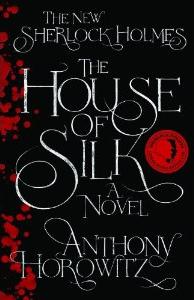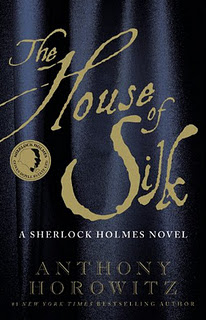Halfway through The House of Silk—a lost tale which purports to take place a decade before the great detective “was found dead at his home on the Downs, stretched out and still, that great mind silenced forever,” and has been hidden from the public since because of the scandalous social and political revelations depicted within—an unshaven Sherlock Holmes stands trial for the crime of murder in the first degree. That he has killed this poor person is allegedly
beyond question. In fact, even the imaginative powers of his biographer would be unable to raise a shred of doubt in the minds of his readers. At the scene of the crime I observed that the gun in his hand was still warm, that there were residues of powder blackening his sleeve and several small bloodstains on his coat which could only have arrived there if he had been standing in close proximity to the girl when she was shot. Mr Holmes was semi-conscious, still emerging from an opium trance and barely aware of the horror of what he had done. I say “barely aware” but by that I do not mean that he was completely ignorant. He knew his guilt, your honour. He offered no defence.
Of course you and I know Holmes has done no such thing. We know that this sensational case, whatever its repercussions, cannot culminate in the arrest of the cavalier crime-fighter for such heinous behaviour, because between now and His Last Bow the highly-held canon has many, many more adventures in store, and Holmes cannot very well be indisposed for those. We know this because The House of Silk is the first new Sherlock Holmes story the estate of Sir Arthur Conan Doyle has sanctioned—in point of fact they commissioned the thing—since the legendary Scots author closed the book on arguably the world’s most famous fictional character… oh, a fearfully long time ago.
Thus the pleasure of The House of Silk, by children’s author Anthony Horowitz, is in learning how Holmes could possibly have gotten himself into such an dreadful pickle, and figuring out—as must Dr. Watson, our man’s beloved biographer, and the narrator of this story—how in the world he’s going to get out of it. And what a singular pleasure it is!
Anthony Horowitz is in truth no more a children’s author than Arthur Conan Doyle was a ship’s surgeon, which is to say yes, he was, and indeed, he is, but just as Conan Doyle’s life’s work was ahead of him after he sailed on the SS Mayumba in his youth, so too does Horowitz’s success reach above and beyond that creation for which he is surely most known; namely the Alex Rider books beginning with Stormbreaker. However Horowitz also so happens to be the author of forty-odd other novels besides the ten—and counting—involving his bestselling baby Bond. Moreover he is the mind behind such much-loved TV series as Foyle’s War and Midsomer Murders, and just recently it was announced that he is to write the screenplay for Prisoners of the Sun, the sequel to Steven Spielberg’s Tintin film, to be directed by Peter Jackson at some point in the (hopefully not too) far-flung future.
So, you know… the guy’s got game. If Horowitz doesn’t immediately seem like the right man for the job—and he certainly wasn’t the most obvious choice—one need only look a little closer to see that in a sense, he’s been building up to this moment all his writing life. He says as much himself in this interview with The Scotsman, to wit: “I’ve spent more than 30 years writing murder mysteries and detective series of one sort or another, whodunits, puzzles, riddles. It all began with Holmes. I can honestly say I owe a huge part of my career to Doyle.”
Nevertheless, to take the reins from none other than he, nearly a century hence, at a time when there is more widespread awareness of the character now than there has been in recent memory—thanks I think equally to the BBC’s masterful if sadly sporadic new series and the feature film franchise starring Tony Stark channelling Jack Sparrow—can be no mean feat. Add to that those undying devotees of Doyle’s cherished detective who have made plain their dissatisfaction as regards virtually every attempt to carry on the case files since the death of their originating author, and still one has hardly begun to grasp the sheer size of the shoes Horowitz must fill, or have failed.
 But this review is no murder mystery, so I needn’t keep you in suspense as to the end result, the final summation, any longer: with no further ado, then—none at all, no sir—The House of Silk is, in short… terrific.
But this review is no murder mystery, so I needn’t keep you in suspense as to the end result, the final summation, any longer: with no further ado, then—none at all, no sir—The House of Silk is, in short… terrific.
Call it revisionist literary history, call it po-faced pastiche, call it whatever you damn well please—and no doubt a certain camp will call The House of Silk a cold-blooded cash-grab, and worse—but be assured, whatever your position going in: it is from first to last a worthy Sherlock Holmes story, and there can be no more persuasive testament to its faithfulness, if not necessarily its greatness, than the fact that the estate of Sir Arthur Conan Doyle have claimed it as canon though I would suggest, with the greatest respect, that they do so at their own peril.
You see, insofar as The House of Silk pays fond homage to the Sherlock Holmes stories we have adored before, over and over, in the same breath Horowitz’s all-too-short sidequel of sorts also serves to shine new light on those things that made the great detective great, not least his ensemble support and the city his stories are set against. We see Holmes guided for once by instinct over intellect; we meet an Inspector Lestrade much improved over the hapless fool of Conan Doyle’s stories; meanwhile the Scots author’s well-to-do London seems in retrospect a positively pleasant place next to the ominous underbelly Horowitz represents so authentically:
It was almost dark and with the coming of the night the sense of ease that I had felt quite dissipated, and the city had once again turned cold and hostile. The shoppers and the entertainers had all gone home and their places had been taken by a different species altogether, shabby men and gaudy women who needed shadows in which to conduct their business and whose business, in truth, carried shadows of its own.
It follows, then, that the mystery-within-a-mystery around which The House of Silk pivots should be a more sordid thing than the whimsical business about a man in a flat cap with which our story begins; and indeed, in short order Horowitz’s novel reveals itself a game of shadows in this city of such, in which each and every curious, creeping coincidence goes to great effect. In fact this is the very reason dear Dr. Watson gives for having hidden the manuscript from view these hundred years.
For all that seems dissimilar about The House of Silk, however, where it counts—in its essential spirit—this new Sherlock Holmes story is so innately faithful to the legacy of Sir Arthur Conan Doyle’s single most celebrated creation as to feel both painstaking and profound. Our narrator captures the feeling ideally at the outset, when he exclaims how glad he is “to be in, with a fire blazing in the hearth, the familiar smell of tobacco in the air and […] a sense that everything was in its right place.”
And so indeed it is. The House of Silk is an encore performance of one of the greatest shows on earth, and with it, I think it’s safe to say… the game’s afoot!
The question is, when can we play again?
It is a continual disappointment to Niall Alexander that Sherlock Holmes is not in fact a real historical figure, but then, neither is Niall Alexander. Instead the elementary entity which writes reviews for Strange Horizons and Starburst Magazine—or failing that on its blog The Speculative Scotsman—is in fact a multifarious fabrication, more shadow than substance… not unlike the man in the flat cap.










